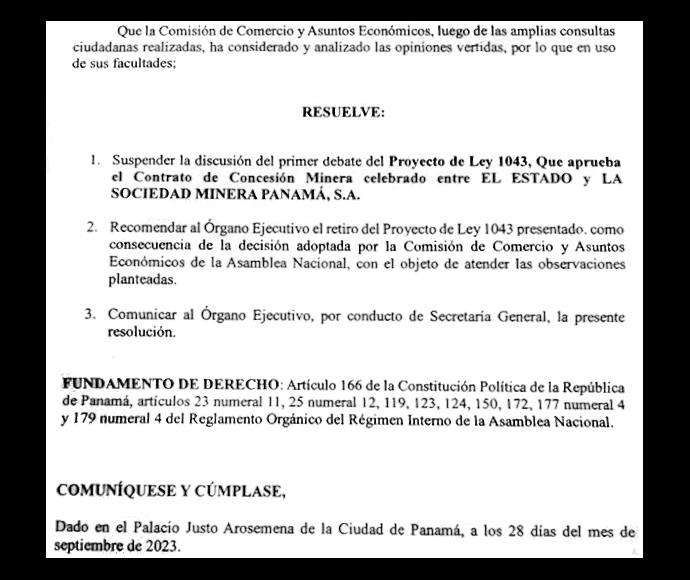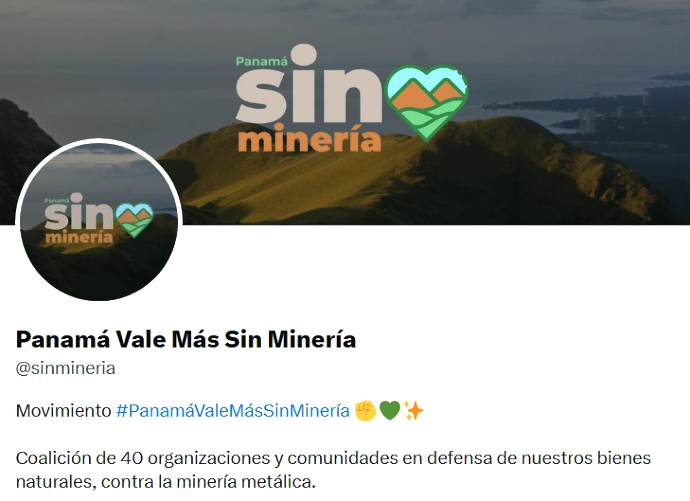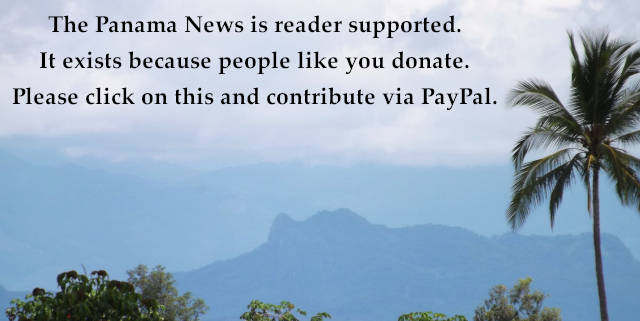Thursday was when a new copper mine contract was set to be jammed through the legislature’s Commerce and Economic Affairs Committee…
by Eric Jackson
It didn’t happen and it will probably be a long time before Panamanians get the whole story about what happened.
Did the ruling Democratic Revolutionary Party deploy its own private polling to the decision-making process? Were party whips told by a sufficient number of deputies that their votes would not be cast for a new and aggrandized contract to replace the old mining concession that the high court threw out as unconstitutional? Did somebody, in some fashion, improperly canvass the Supreme Court and come away with the impression that the magistrates would strike down the proposed new deal? Did intelligence and political operatives tell top public officials that the proposed new agreement would, if passed, set off massive new protests? Was it a matter of committee members getting cold feet based on estimates of what votes for the mining proposal would mean for their own re-election chances?
One partial official version of the moment comes from the executive branch, whose Minister of Commerce and Industry Federico Alfaro Boyd said after the committee suspended discussion of the matter that the proposal would be “re-adjusted” and brought back.
The vote in the committee to suspend discussion and advise the president to withdraw the proposal was 5-4. The obvious inference is that there were not the votes in the committee to pass what had been proposed. But was it a matter of the committee members’ particular views, or a matter of head counting in the National Assembly as a whole that indicated a low probability that the deal could pass as it was?
The reasons specified in the resolution were various, and the weight of each of those with each committee member casting a vote would mostly be a matter of speculation. However, the committee resolution referred to the weight of such public opinion as was sampled opposed the mining deal, and specifically because:
* It allows the company, via the Civil Aeronautics Authority, the power to restrict the airspace above and around its operations:
* It allows the company to extend its operations to other unspecified parts of the country, including the power to expropriate privately owned lands;
* It refers to the local subsidiary of First Quantum rather than the final beneficiary parent company;
* It specifies that this contract would serve as a pattern for future deals with other parties.
The resolution did not especially refer to history, nor to law. However, the original 1997 concession was declared unconstitutional by the Supreme Court because it was not the subject of any bidding procedure and that defect remained unaddressed.
The history of this particular mining concession, the Donoso copper project having been carved out of the original, is of a gold mine with few of the basic environmental safeguards and replete with illegal stuff like management appropriating the payroll deductions that should have gone to Seguro Social in the individual workers’ accounts, the use of the mine and its Canadian stock for a vast international insider trading and fraud scheme, and a final gold mine crash that left debts owing and a huge mess to clean with a failed company unable to meet those obligations.
This pattern of environmentally damaging extraction, bust and unaccountability is essentially the history of mining ventures in Panama, for gold, silver, manganese and molybdenum. There are horror stories like the previous project to strip gold out of the Azuero Peninsula’s Cerro Quema and its runoff into the Tonosi River, but no attractive examples of success to hold up as models of how metal mining should be done.
We do not know all that was going on in the committee members’ minds, but it’s no big stretch to understand how a ban on aerial surveillance of mining company operations would, aside from political arguments over national sovereignty, be a nonstarter. And how a contract with a subsidiary that might be left as a bankrupt shell rather than a multinational mining giant with deep pockets would matter. The prospect of private foreign companies wearing the essentially governmental power of eminent domain replicated all over Panama, terrifying to farmers and to the indigenous comarcas as it is, might be considered as just gravy.
Then there are matters of deception – sham hearings with company employees on the speakers list and crowds of locked-out critics screaming on the outside were the obvious things, but on the morning when the committee was expected to vote La Prensa’s lead story was about the suppression of official economic statistics under the present administration and by the Comptroller General in particular. It matters because the mining colony scheme is presented by the Cortizo administration as the only solution to funding our public pensions, health and education systems. Panamanians were being asked to support a drastic set of conditions due to economic exigencies, without being allowed to look at the books.
So, what now?
Panama has general election at the beginning of next May. By the ordinary legislative calendar, the National Assembly adjouns from the end of October until early in January, and then goes into recess again at the end of Aoril until after the election. The president might call for special sessions during the recesses.
There are well known corny tricks that legislatures play, and also an electorate that has been aroused and polarized by this proposal. In next month’s scramble before the recess, might the deputies pull a “madrugonazo,” pulling the proposal off of the table without prior notice and racing it into law at, say, two in the morning? Rules requiring passage on first reading by a committee and then on second and third readings by the legislature as a whole would seem to prevent this, but those procedural barriers have been hopped over before.
However, would a ruling party that already faces the history of Panamanian voters usually throwing the incumbent president’s party out of power want to inflame the electorate by passing such an unpopular and consequential measure by such means?
To estimate the answer to that question, it helps to set aside the traditional rules of discipline that Panamanian political parties have and look at the Democratic Revolutionary Party as other than monolithic. Some obvious starting points are the son of the party’s founder and a former president of Panama himself, Martín Torrijos, running for president on another party’s ticket, and a PRD legislator running for president as an independent and for mayor of San Miguelito as a Martinelista. Or to look at it from another angle, see the former PRD mayor of Panama City and the party’s 2014 presidential standard bearer, Juan Carlos Navarro, among the leading voices against the mining colony proposal.
That’s not the end of the calculations, though. There are surely many down-the-ticket PRD elected officials counting Vice President Gaby Carrizo as a clownish smiley-faced loser in general election in which they might hold onto their own public jobs. Or if bribery of one sort or another comes into play, that although this stint in government office might end, they would be paid well or otherwise be taken care off to live happily ever after.
The problem with a bribery scenario is that it can only be kept relatively secret if the vote in the National Assembly chamber would be close to begin with. If the trend is for the plan to go down to defeat in a rout, the number of bribes that would have to be paid would be so high that there could be no secret, not even a short-term one, about the corrupted process.
Is the PRD willing to disintegrate, to be decimated in next May’s elections, in one last blaze of infamy? Stranger things have happened but it seems unlikely. The mining deal looks like a goner.
However, the most astute and energetic mining opponents seem unwilling to passively accept that as a given reality. Some of them have greater goals in mind. All of them are jaded from having been deceived too many times about too many things.
Insurgent presidential candidate Ricardo Lombana sees the opponents’ knees wobble.
He’s going for the knockout punch.
Former Panama City vice mayor Raisa Banfield, a salient figure in the movement against the mine, questions the numbers thrown out by First Quantum and argues that “the jobs are just a facade.” Especially since the comptroller’s office would have those figures but is withholding them.
The Panamá Vale Más Sin Minería coalition, on its Twitter feed, argues that “Withdrawal is not rejection. Neither is suspension rejection. There is nothing to renegotiate. There is a court judgement to carry out. Close the Cobre Panama project and ban metal mining throughout Panama!”
CIAM, the environmentalist law firm, warns that “The mining contract has NOT been rejected. It remains before the National Assembly.”
The calls for almost daily anti-mining street demonstrations have been wearying and gradually less fruitful for those opposed to the proposed concession to First Quantum. Meanwhile, however, throughout Panamanian society groups large and small, staid and militant, of a wide variety, have been talking about and pronouncing positions on the proposal.
Perhaps the most weighty was a September 24 order from a meeting of community leaders in the Ngabe-Bugle Comarca. The pronouncement, in light of the well-known indigenous resistance to plans to strip-mine Cerro Colorado for copper a few years back, may have drawn chuckles from the more foolish legislators who support the mining colony. It’s surely taken as a shot across the bow for those of their colleagues with functional wits and memories. And for presidential candidates? That comarca, notwithstanding fractious intra-ethnic politics, a basic divide between the Ngabere-speaking majority and Buglere-speaking minority, different religious identities that are all at play, is historically THE swing region in Panamanian presidential politics.
It may be time for a breather, but the grand coalition that opposes mining isn’t going away and shutting up.
So, is it a delay for the PRD government to regroup, come back with a divisive new draft and drive wedges into something like a national consensus against mining schemes? That may be the intent on one side of it, but it’s also an opportunity for the anti-mining forces to gather new energy and formulate new strategies and tactics to confront what may be coming next.
Contact us by email at fund4thepanamanews@gmail.com
To fend off hackers, organized trolls and other online vandalism, our website comments feature is switched off. Instead, come to our Facebook page to join in the discussion.
These links are interactive — click on the boxes













